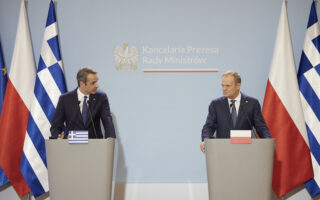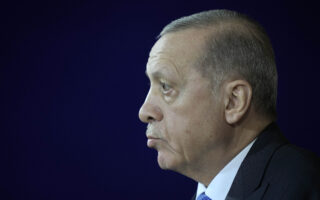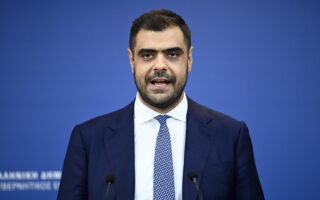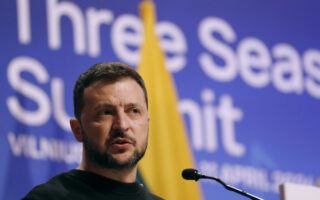Latvian president urges more EU defense spending
Edgars Rinkevics tells Kathimerini that Europe needs more coordination and increased capabilities to stave off risks to its security

Athens and Riga agree that European defense spending should be exempt from fiscal rules, Latvian President Edgars Rinkevics told Kathimerini in an interview ahead of his two-day visit to Athens on Wednesday, where he met with political and state officials. Rinkevics furthermore said that regardless of who wins the upcoming presidential elections in the United States, Europe will need “to be more serious about its own defense and security.”
You are visiting Athens for the first time as the president of Latvia. How close are Greece and Latvia regarding ongoing international issues? Also, I noticed that you met some people from the Latvian community living in Greece. Is the community here big?
It was a bit strange to realize that the last state visit of a Latvian president was in 2002. The last Greek presidential visit to Latvia was only two years ago, in 2022. This exchange of high-level visits between the two countries demonstrates that both Latvia and Greece are like-minded nations. We had very good discussions with the president, the prime minister and the president of the Parliament on a variety of bilateral issues, boosting economic ties, Covid, quite a big problem for the development of trade relations and exchange of tourism, but now we are recovering from that. But most of the discussion was devoted to EU issues. Both Latvia and Greece protect external EU borders. We see many issues in the same way. We want to secure more European funding for external border security, more European defense spending, capacity building. We are also discussing EU enlargement in the Western Balkans. We are of the same opinion that the EU was not able to use all the opportunities and we are facing this more challenging situation in the Western Balkans than 10 or 20 years ago. Where we are not present as the EU, someone else is present. Of course, for Ukraine both our countries have provided all kinds of support. Finally, about the Latvian community, I was asking our ambassador how many Latvians are here, and she said that we don’t have an exact figure, because we are both in the EU. Estimates are about 600, but yesterday I met less than 10% of them.
You will be in Washington next week for the NATO Summit. It’s the last summit of this Biden administration before US elections. Things in Ukraine are in an operational deadlock and there is an ongoing discussion about what NATO can do to continue to support Ukraine and whether that would be politically feasible in the event of a political changeover in the US. Are there things to be done to consolidate Western support for Ukraine? Would the summit be in that direction, or is support inside the West on the wane?
‘Whoever wins the US presidential or congressional elections, doesn’t substitute for the need for Europe to be more serious about its own defense and security’
You are right. This is the summit that has the chance to cement a long-term support strategy for Ukraine. And from that point of view we very much support the idea of the secretary-general of NATO, Jens Stoltenberg, to put in place the long-term Ukraine Support Fund, which would not depend so much on political developments in member-states. Whether we are going to agree or not, we still have less than a week. The work is there. I’m quite optimistic that we can do that. What is clear is that the NATO Summit is not going to invite Ukraine to start accession talks. Among 32 member-states there is no agreement on this, and I don’t believe there is going to be one. So far, I’m not hearing – but again this is a very fast-developing situation – that there is a member-state opposing. So far, we have Hungary that says that it will not oppose a general decision, but they don’t want to be involved in this kind of assistance program, which I think is OK. Whether that’s enough for Ukraine? Ukraine still sees bilateral agreement programs. That’s why I see these bilateral security guarantee agreements as important. But let’s make no mistake, it is not a substitute for Article 5. Everything but Article 5.
There has also been huge discussion in the EU, after the European Parliament elections, about where the EU is going. There is the potentiality of a commissioner for defense, for common projects, and questions are being asked about whether, politically, the EU can handle a war in European territory by itself. There are proposals like the one put forward by the prime ministers of Greece and Poland for a common air defense. Do you believe that there can be consensus on a common European defense, and not just some coordinating bureaucracy with no real influence?
Look, I think that the realization that Europe must do more for defense, spending more on defense, boosting defense industrial capabilities, is there. I hear the question about whether you are afraid that one US candidate or another will be elected. My answer is always that whoever wins the US presidential or congressional elections, in the long term, doesn’t substitute for the need for Europe to be more serious about its own defense and security. But we must take a couple of steps. Number one, the EU must spend much more on defense. The current defense spending figure of the EU is miserable compared to other programs. That requires us to find more money from the EU budget. EU member-states should spend a minimum of 2%. It’s easy for Greece and Latvia, which spend more than 3%, to talk. But it’s not about the targets but spending money on ammunition and everything else. I’ve been talking with some leaders of the European defense industry and they are all saying that we can produce much more, but only on one condition, that there is money and long-term contracts. Defense commissioner? I don’t have anything against that but only on one condition. So long as it’s not another bureaucrat who is producing tons of paper. We need more coordination, we need more of a boost for defense, we need someone who talks on behalf of the EU defense industry and probably does it full-time. We had a very good discussion with your prime minister and we agreed that European defense spending should be exempt from fiscal rules. By the way, it’s very difficult to break the resistance of the ministers of finance. But we are at a critical juncture. Fiscal discipline is of course a great thing, but the security of the continent is at stake and nobody will care about fiscal discipline rules if we are about the break the Union as it is. So I would say I’m all for everything that really increases our capabilities but I don’t want to see another coordination cell being established with no real impact on our defense.
We hear constantly from the Baltics about if Ukraine falls, what will be left to stop Putin from invading the Baltics. Is that a real possibility? All countries are members of NATO and EU.
I think that sometimes we get some misperception or get lost in translation. My message so far to my own public and to the international audience is that we are members of both NATO and EU. And this is the best security deal one can get nowadays. Ukraine wants to become a member of both. I’m confident that if Ukraine had been a member of NATO and the EU by February 2022, most probably there wouldn’t have been a Russian attack. But the fear is that if Russia feels victorious, if Russia thinks that NATO and the EU are both very weak organizations, in that case they may feel tempted to test limits. Frankly at the Latvia-Russian border there are no Russian troops stationed. More units have left for Ukraine than one can imagine. But if Russia feels victorious, if it gets time to recruit, if there is a kind of internal bravado to test limits, I still think Russia will fail. NATO and the EU are stronger than we sometimes feel. Compare the Baltic states with Ukraine. Compared to the vast territories of Ukraine the Baltic states are rather tiny.
Yes there was a fear in 2022. It has been addressed, NATO has increased its presence. A lot depends currently on how Russia is going to perceive the developments in the world. If they feel that we are failing and they are winning, I do believe that countries in Central Asia or countries in the Caucasus or Moldova will be their next target. I know it’s not very popular to compare, but we need to make this comparison. It’s like the Nazi Germany in the 1930s. They were not stopped, so they continued to advance until they were stopped. Unfortunately, with an authoritarian regime, where you don’t have internal checks and balances, things may happen. In democracies you have governments, parliaments, you have parties, judicial, legislative or executive branches. In Russia there is a president and God knows what kind of pressure groups and what they really sense as the sense of reality. If you analyze the Russian propaganda machine you will realize that they left reality years ago. We have to make sure that we increase our capabilities on the eastern and southern flank so we make sure Russia never tests us.





